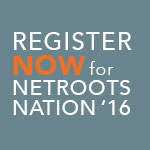After a great run, the Winning the Internet blog has been retired. However, you can still keep in touch with New Media Mentors here.
As we gear up for Netroots Nation 2013, we’re taking a closer look at some of the convention’s hottest training sessions. We’re interviewing the trainers and taking you inside some of online activism’s most popular and elusive topics.
Today we’re interviewing Brandon Fureigh, who’ll be leading Five Secrets: The Proven Neuroscience Behind Persuading Voters.
NN13 Training Session
Five Secrets: The Proven Neuroscience Behind Persuading Voters
Everyone remembers the first time that State Sen. Barack Obama came onto the national stage. This guy from Illinois with a funny name delivered a speech that many say is the reason he is now President. Not many of us remember what policies he spoke about, but we remember how he made us feel. Leveraging scientific research and case studies, this session will train participants in how to connect with voters on an emotional and values based level.
Interview
Q: Tell us about your experience with persuasion.
A: Before entering politics I worked in the entertainment industry for 15 years as an actor, producer, and director. Convincing people to believe me was my life. Turns out politics and acting are not so different! Human beings are wired to tell and connect through stories. Facts and figures alone will never convince people you are right.
I grew up in a conservative military family who continues to test my persuasion skills to this day. One of several clear victories I have had with not just my own family, but conservatives across the country was the work I did while serving as Advocacy Director for the Truman National Security Project. We designed a clean energy and climate security campaign designed to persuade conservatives to support clean energy policies on a state and federal level. We were able, during a time of fierce partisanship, to bring together Republicans and Democrats alike in D.C. and in states across the country to support and pass clean energy legislation. In fact, our bill here in California passed the State Senate unanimously. The 5 steps we will cover in our session were and continue to be the key to our success.
Q: In your opinion, why is it important to emotions and values to connect with voters?
A: Does this person understand me and my family and the struggles we go through day to day? Will he/she keep me in mind when they vote on a particular piece of legislation? These are the questions most Americans ask when deciding which candidate they will support. It’s not enough to be right. We have to be able to explain how our policy positions will have a positive effect in the lives of the American people. The majority of people support candidates they trust above all else. The most powerful way to build trust is to connect to people through emotions and values. They need to know that we get it and that we care. Once that trust is established, we will be more effective in our efforts to persuade the public that our candidates and the policies they are fighting for are the ones that will help keep their families safe and secure. If we can’t convince them of that, we’re toast.
Q: What are the two most important tactics to consider when persuading voters?
A: Ultimately persuasive communications is about moving the electorate up the spectrum of support from being against you to actively supporting you. One important tactic in achieving this goal is determining where on the spectrum of support this individual lies and which narrative will be effective. We will cover the Base Narrative, Majority Narrative, and Persuasion Narrative and how to use them effectively. The second tactic is to use one of the 3 values based message frames we have created that connect to almost every American equally. These frames, when used appropriately, are a powerful tool in strategic and persuasive communications.
Q: Why should folks attend your session at Netroots Nation, and how can they connect with you?
A: We fight for policies we all believe are good for this country and the American people. We are at a turning point. We have an opportunity to build support among those who traditionally have not supported us. These 5 steps are tools that key to our success. This is a fun and interactive session that will allow you to put our 5 steps to the test.
Feel free to contact me on Twitter: @BrandonFureigh.
To attend this training, or one of the 39 others at Netroots Nation 2013 in San Jose, register now.




Comments are closed.